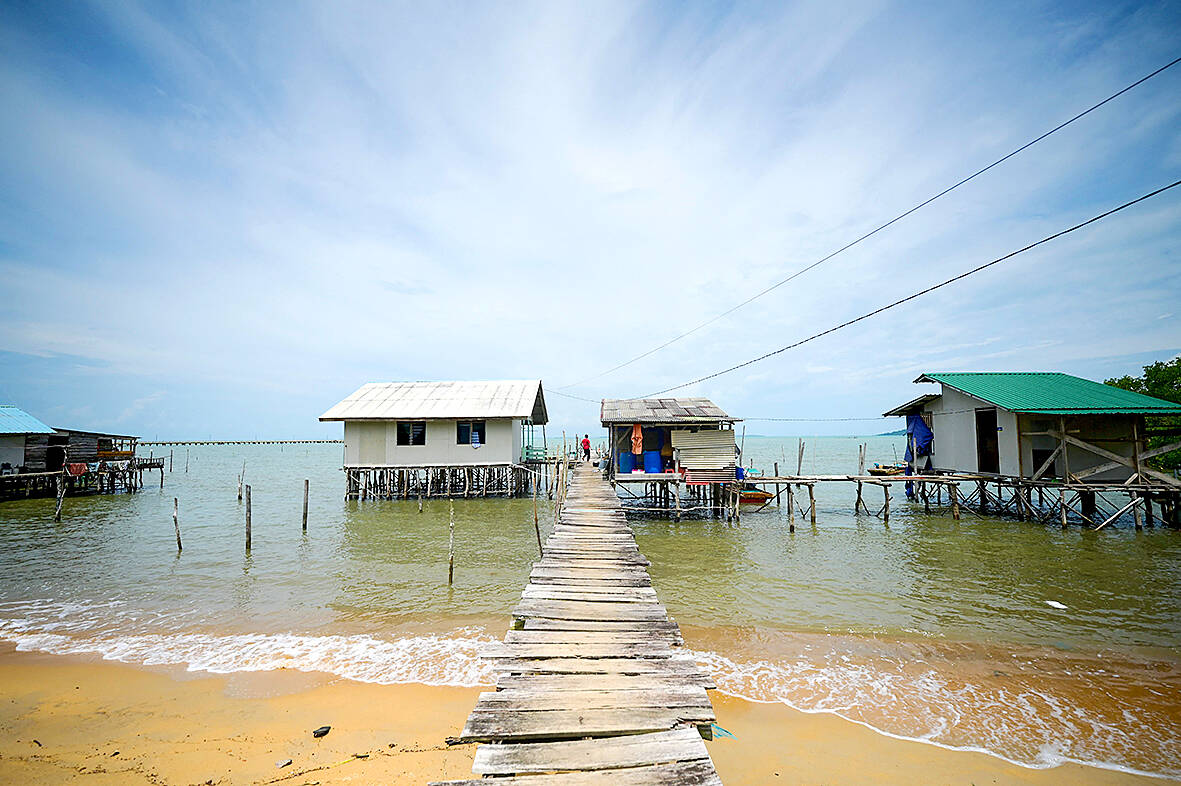Sitting on a creaky bridge linking stilt houses, Indonesian fisherman Sadam Husen fears for his people and their traditions, knowing they may be uprooted from their ancestral land to make way for a China-funded megaproject worth billions.
The Indonesian government recently told Rempang island’s 7,500 residents to pack their bags and leave by the end of last month.
Residents say their families have been present on the South China Sea island for more than a century, mostly earning a living as fishermen, catching fresh snapper, shrimp and sea cucumbers.

Photo: AFP
But under government plans the villagers, who include members of the Malay and Orang Darat tribes, are to be relocated away from their homes and replaced by a huge quartz sand processing plant. Experts say the move will leave them jobless and potentially erase their way of life from the island forever.
“It’s getting more tense. We have no interest in going out to sea,” said 32-year-old islander Husen, who has peacefully protested the eviction plan. “The most important thing is to save our village,” Husen said.
“I have not been able to sleep for a month thinking about my village.”

Photo: AFP
Jakarta says one of the world’s biggest glass and solar panel makers, Hong Kong-listed Xinyi Glass, will invest US$11.6 billion in the plant after a July deal struck between President Joko Widodo and Chinese counterpart Xi Jinping (習近平).
Residents say authorities turned up at their villages to survey the land in preparation for the project’s construction — sparking protests attended by thousands.
On Batam island, which neighbors Rempang, demonstrations outside government offices turned into clashes with police. Protesters used Molotovs, stones and glass bottles, according to officials and police, who responded with tear gas and water cannon.

Photo: AFP
Dozens of locals were arrested and hundreds of riot police were deployed.
Another protest was held outside the Chinese embassy in Jakarta.
‘THEIR EXISTENCE IS THREATENED’
The Indonesian government has said construction work on the plant will begin next year, and that it will transform the island into an “eco-city” attracting thousands of jobs and billions in investment by 2080.
Xinyi Glass did not respond to a request for comment.
Beijing has poured billions into natural resources in Indonesia in recent years, particularly nickel on Sulawesi island.
For now, the protests appear to be paying off, if only temporarily.
The government has suggested moving residents to other locations on Rempang, rather than off the island entirely, and postponed last month’s eviction date.
While no new date has been announced, the locals say it is only a matter of time before they are evicted.
“Their existence is undoubtedly threatened by this project. The fishing community will be severely threatened on land and at sea,” said Parid Ridwanuddin, coastal and marine campaign manager at Indonesian NGO Walhi.
“The fishermen on Rempang island will vanish.”
‘I WILL NOT SIGN’
A villager who declined to be named said she would not bow to government pressure or compensation offers.
“If God wants this to happen there is nothing I can do. I will stay put and not sign,” she said.
The 17,000-hectare island near the Malacca Strait, one of the world’s busiest shipping routes, is rich in the quartz sand needed to make solar panels — and the government aims to develop an industrial zone there.
On Rempang, authorities have identified around 700 affected families.
Each has been promised 500 square meters of land and a 45-square-metre house worth around 120 million rupiah (US$7,800) in compensation. Islanders have been told they will first be housed in apartments on neighboring Batam, each receiving 1.2 million rupiah monthly for half a year while the replacement houses are built.
“We all agree that Indonesia needs money to pour in, and one of the ways is through investment,” Batam city mayor Muhammad Rudi said. “If they (China) get scared and leave, what will become of Rempang?”
But residents say they have received no guarantees the compensation pledges will be honored — particularly as the government disputes their claim to have official deeds that prove their land or home ownership.
“So far it is just talk,” said Timo, a 67-year-old village community leader, who like many Indonesians has one name. While the authorities are demanding deeds, NGOs say Indonesia’s agrarian laws recognize the community’s ancestral relationship with land and sea resources. “The government must affirm and serve the community’s right to the land by granting land rights,” said Walhi’s Ridwanuddin.
‘CLIMATE OF FEAR’
On the one-hour drive from Batam island to Rempang, banners and stickers urging people to relocate plaster the roadside. There is a heavy police and military presence on the streets near Sembulang, one of the villages under orders to evacuate.
The unnamed villager said police officers and government officials have been knocking door to door, urging people to move.
“I am afraid they will enter my house in the middle of the night and force me out,” she said.
Mayor Rudi denied his staff had intimidated residents.
Amnesty International Indonesia said the police deployment had “created a climate of fear.”
The government claims the project will take up 2,300 hectares, while leaving 10,000 hectares of conservation land untouched. But it could damage Rempang’s marine life, pollute the area and over-exploit its vast sand resources, according to Walhi.
Residents are also wary that potential jobs will be occupied by more skilled Chinese workers.
“Even if our local workers are employed, they might be hired as blue-collar workers,” said Timo, the community leader.
Like many other villagers, Timo said he feared for his relatives’ graves and their possible desecration because of the project’s construction.
“We will never want to be relocated,” he said.
“Our hearts feel heavy. For us this is the final price.”

The unexpected collapse of the recall campaigns is being viewed through many lenses, most of them skewed and self-absorbed. The international media unsurprisingly focuses on what they perceive as the message that Taiwanese voters were sending in the failure of the mass recall, especially to China, the US and to friendly Western nations. This made some sense prior to early last month. One of the main arguments used by recall campaigners for recalling Chinese Nationalist Party (KMT) lawmakers was that they were too pro-China, and by extension not to be trusted with defending the nation. Also by extension, that argument could be

Aug. 4 to Aug. 10 When Coca-Cola finally pushed its way into Taiwan’s market in 1968, it allegedly vowed to wipe out its major domestic rival Hey Song within five years. But Hey Song, which began as a manual operation in a family cow shed in 1925, had proven its resilience, surviving numerous setbacks — including the loss of autonomy and nearly all its assets due to the Japanese colonial government’s wartime economic policy. By the 1960s, Hey Song had risen to the top of Taiwan’s beverage industry. This success was driven not only by president Chang Wen-chi’s

Last week, on the heels of the recall election that turned out so badly for Taiwan, came the news that US President Donald Trump had blocked the transit of President William Lai (賴清德) through the US on his way to Latin America. A few days later the international media reported that in June a scheduled visit by Minister of National Defense Wellington Koo (顧立雄) for high level meetings was canceled by the US after China’s President Xi Jinping (習近平) asked Trump to curb US engagement with Taiwan during a June phone call. The cancellation of Lai’s transit was a gaudy

The centuries-old fiery Chinese spirit baijiu (白酒), long associated with business dinners, is being reshaped to appeal to younger generations as its makers adapt to changing times. Mostly distilled from sorghum, the clear but pungent liquor contains as much as 60 percent alcohol. It’s the usual choice for toasts of gan bei (乾杯), the Chinese expression for bottoms up, and raucous drinking games. “If you like to drink spirits and you’ve never had baijiu, it’s kind of like eating noodles but you’ve never had spaghetti,” said Jim Boyce, a Canadian writer and wine expert who founded World Baijiu Day a decade